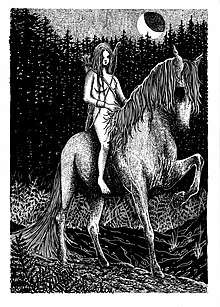Devana
Devana or Dziewanna is the Slavic goddess of the wild, nature, forests, and the hunt.[1] She is the Slavic equivalent of the Roman goddess Diana, and Greek Artemis, mentioned by 15th century Polish historian Jan Długosz in Annales seu cronici incliti regni Poloniae (History of Poland). Her name, though similar to Diana's, is apparently derived from a Slavic word that means 'virgin' or 'maiden' (dziewa, dziewica) or else from the Proto-Indo-European root *dewas ("god, wonder") (see Deus). However, most contemporary scholars don't regard Annales seu cronici incliti regni Poloniae as a reliable source on Slavic mythology and have doubts about the existence of such a deity in the Slavic pantheon.[2]

However, Victorian folklorist, Sir James George Frazer tells us that an effigy is carried in from the woods, “which goes by the name of Summer, May, or the Bride: in the Polish districts it is called Dziewanna, the goddess of spring.”[3]
The minor planet 471143 Dziewanna, a trans-Neptunian object was named after the Slavic goddess.[1]
Also see
| Wikimedia Commons has media related to Devana. |
References
- "471143 Dziewanna (2010 EK139)". Minor Planet Center. Retrieved 5 October 2018.
- Brückner A. Mitologia słowiańska, Kraków, 1918
- Frazer. Sir James (1993) The Golden Bough, London: Wordsworth.